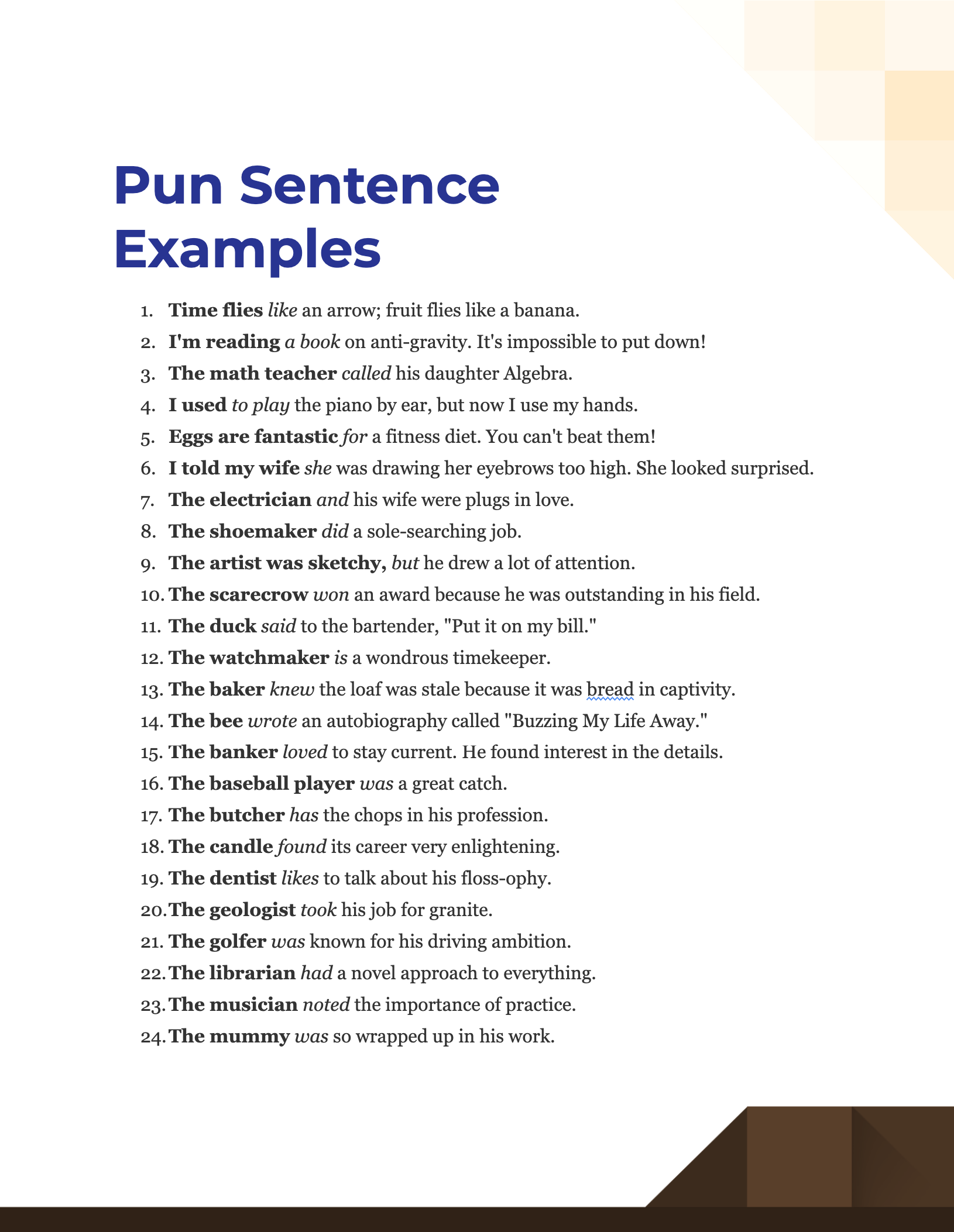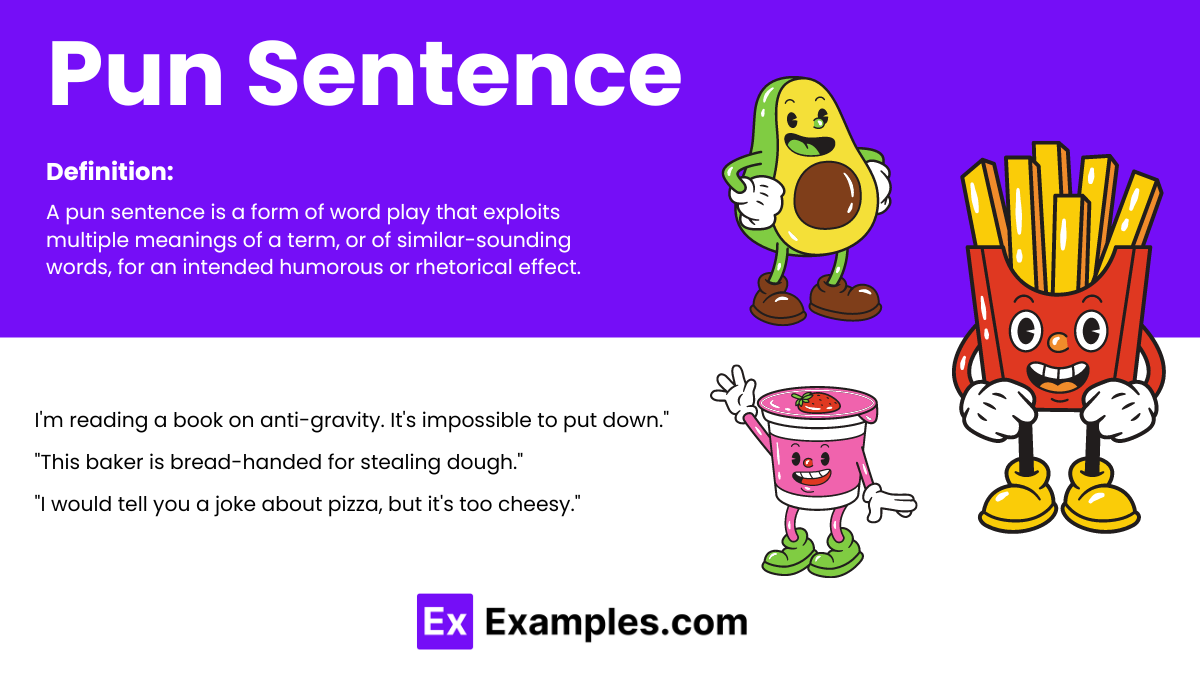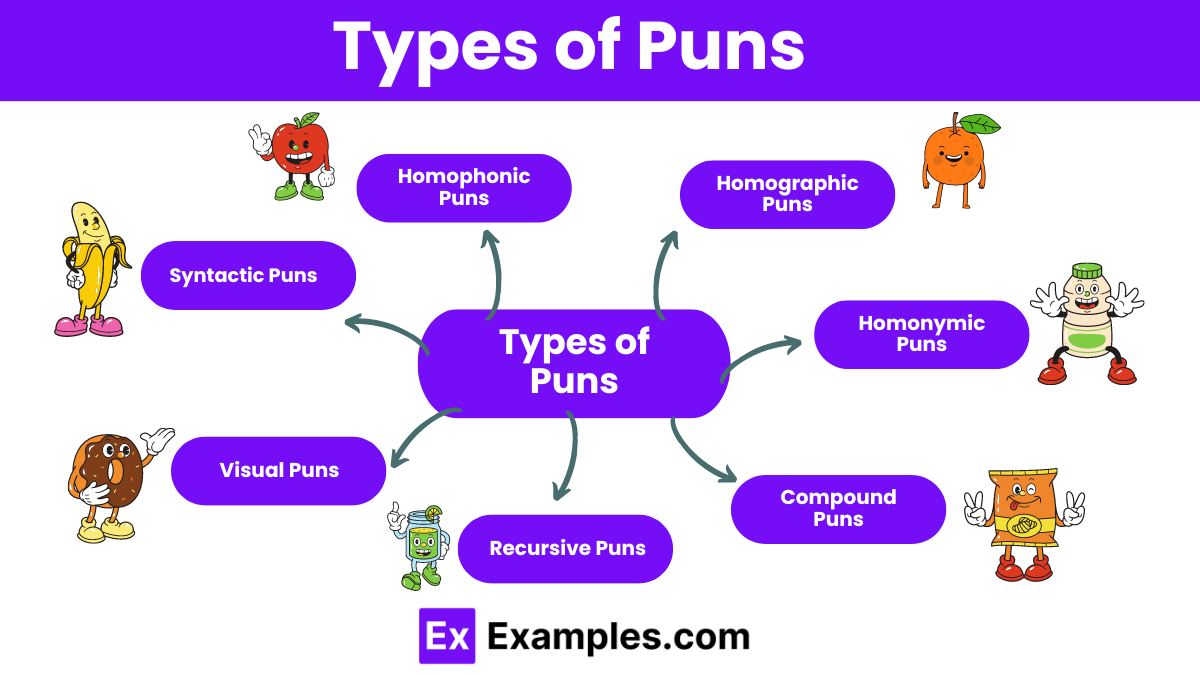99+ Pun Sentence Examples
Dive into the delightful realm of pun sentences, where words dance and meanings playfully intertwine. A blend of humor, wit, and linguistic agility, puns have charmed readers for centuries. Within this guide, explore captivating pun sentence examples, master the craft of penning them, and learn how to effortlessly infuse humor into your writing, making every sentence a potential source of amusement.
What is the Pun Sentence? – Definition
A pun sentence is a form of word play that exploits multiple meanings of a term, or of similar-sounding words, for an intended humorous or rhetorical effect. These sentences are crafted to create a joke or to induce amusement by leveraging the ambiguity between the words. Puns can be homophonic (words that sound alike but have different meanings), homographic (words that are spelled the same but have different meanings), or homonymic (a combination of the two).
Tips for Using Pun Sentences
- Understand Your Audience: Tailor your puns to the interests, age, and cultural background of your audience to ensure they understand and appreciate the humor.
- Keep It Relevant: Use puns that are relevant to the topic at hand. Irrelevant puns can distract or confuse your audience.
- Use Sparingly: Moderation is key. Overuse of puns can dilute their effect and annoy your audience. A well-timed pun is more impactful than a barrage of wordplay.
- Clarity Is Crucial: Ensure your pun is easy to understand. If a pun requires too much explanation, it loses its humor.
- Aim for Simplicity: Simple puns are often the most effective. Complicated wordplay can confuse rather than amuse your audience.
- Be Mindful of the Setting: Consider the context in which you’re using puns. Some situations (like formal presentations) might not be the right place for playful language.
- Practice Wordplay: Enhance your pun-making skills by practicing wordplay. Read and create puns regularly to develop a sense of how to craft them cleverly.
- Prepare for Mixed Reactions: Accept that puns can elicit a range of reactions, from laughter to groans. Not every pun will be a hit, and that’s part of the charm.
- Reflect on Timing: Timing can make or break a pun. A well-placed pun can be the highlight of a conversation or piece of writing.
- Use Visual Aids (When Applicable): In written communications or presentations, visual aids can enhance the impact of a pun, making it clearer and more engaging.
- Encourage Interaction: Puns can be a great way to encourage interaction in social settings or online platforms. They can spark conversations and make discussions more lively.
Different Types of Puns
Homophonic Puns
These puns arise from the use of words that sound alike but have different meanings. The humor or wordplay comes from the auditory confusion between the words, which usually results in a sentence or phrase with a humorous double interpretation.
- Example: “I used to be a baker because I kneaded dough.”
Homographic Puns
These involve words that are spelled the same but have different meanings and sometimes different pronunciations. This type of pun exploits the dual meanings that a single word can convey.
- Example: “The broken window was a pane to fix.”
Homonymic Puns
Homonymic puns play on words that are both homographs and homophones; they are spelled the same and sound the same but have different meanings. This dual similarity allows for a seamless but humorous confusion.
- Example: “Being struck by lightning is a shocking experience.”
Compound Puns
Compound puns involve multiple puns within the same sentence or phrase, often building on the humor by integrating more than one play on words.
- Example: “I’m reading a book on anti-gravity. It’s impossible to put down!”
Recursive Puns
Recursive puns, also known as puns on puns, occur when the first part of the joke creates a humorous effect, which is then further enhanced or modified by a second pun.
- Example: “I really wanted a camouflage shirt, but I couldn’t see one.”
Visual Puns
Visual puns involve images that suggest a playful interpretation of words, often requiring visual representation to be understood. They rely on the appearance or representation of objects or symbols to create a pun.
- Example: A drawing of a piece of wood dressed as a king could be a “ruler.”
Syntactic Puns
Syntactic puns exploit the rules and structure of language, playing on grammatical ambiguities and the multiple ways sentences can be understood based on their structure.
- Example: “A chicken crossing the road is poultry in motion.”
100+ Pun Sentence Examples

Embrace the whimsical world of pun sentences, where wit, humor, and linguistic finesse come together in a delightful dance of words. Whether used to inject humor, create memorable moments, or simply play with language, puns are a timeless tool in the writer’s arsenal. Dive deep into our curated selection of 100 pun sentence examples, each crafted to entertain, enlighten, and elicit smiles. From playful jests to clever quips, let these pun-tastic sentences inspire and amuse.
- Time flies like an arrow; fruit flies like a banana.
- I’m reading a book on anti-gravity. It’s impossible to put down!
- The math teacher called his daughter Algebra.
- I used to play the piano by ear, but now I use my hands.
- Eggs are fantastic for a fitness diet. You can’t beat them!
- I told my wife she was drawing her eyebrows too high. She looked surprised.
- The electrician and his wife were plugs in love.
- The shoemaker did a sole-searching job.
- The artist was sketchy, but he drew a lot of attention.
- The scarecrow won an award because he was outstanding in his field.
- The duck said to the bartender, “Put it on my bill.”
- The watchmaker is a wondrous timekeeper.
- The baker knew the loaf was stale because it was bread in captivity.
- The bee wrote an autobiography called “Buzzing My Life Away.”
- The banker loved to stay current. He found interest in the details.
- The baseball player was a great catch.
- The butcher has the chops in his profession.
- The candle found its career very enlightening.
- The dentist likes to talk about his floss-ophy.
- The geologist took his job for granite.
- The golfer was known for his driving ambition.
- The librarian had a novel approach to everything.
- The musician noted the importance of practice.
- The mummy was so wrapped up in his work.
- The sailor liked to tide things over.
- The astronomer came up with stellar presentations.
- The ghost was known for his boo-ming personality.
- The gardener had a blooming career ahead of him.
- The fisherman knew all the net gains and losses.
- The butcher backed up into the meat grinder and got a little behind in his work.
- The tailor stitched together a fitting career.
- The photographer had a focus on success.
- The tennis player found love on the court.
- The teacher had a class of her own.
- The mechanic knew how to gear up for challenges.
- The accountant counted on his calculator.
- The chemist found elements of surprise in his experiments.
- The thief had a steal resolve.
- The bartender mixed his priorities right.
- The scientist had a positive reaction to new findings.
- The programmer found a byte of success.
- The firefighter was known for blazing trails.
- The optometrist had a clear vision for the future.
- The lawyer had a solid defense mechanism.
- The writer used puns to write between the lines.
- The chef cooked up a recipe for success.
- The electrician was truly wired for success.
- The pilot soared to new heights in his career.
- The psychologist had a mind to understand others.
- The florist blossomed in her profession.
- The archaeologist dug deep into history.
- The builder constructed his future brick by brick.
- The pilot’s career was really taking off.
- The soldier stood up for what he believed in.
- The marathon runner knew the long run’s worth.
- The poet used rhyme and reason.
- The taxidermist stuffed all his challenges away.
- The banker knew the value of every penny saved.
- The hairdresser brushed off all obstacles.
- The vet had a lot of animal instinct.
- The locksmith found the key to success.
- The animator drew inspiration from life.
- The plumber went with the flow.
- The postman delivered his best every day.
- The reporter wrote his way into headlines.
- The mailman sorted out his priorities.
- The pharmacist had the right prescription for success.
- The DJ knew all the beats of life.
- The jeweler had gems of wisdom.
- The detective could read between the lines.
- The cyclist wheeled his way to the top.
- The editor cut out all distractions.
- The filmmaker had a reel passion.
- The cartographer charted his own path.
- The podiatrist stepped up in his field.
- The elevator technician lifted his spirits high.
- The statistician counted all possibilities.
- The pediatrician had a kid-centric approach.
- The dermatologist made skin-deep observations.
- The fishmonger scaled up his operations.
- The historian revisited the past to understand the present.
- The carpenter nailed every project he undertook.
- The alogist heard every concern.
- The brewer had an intoxicating charm.
- The cardiologist knew every heartbeat mattered.
- The astronomer reached for the stars.
- The nutritionist measured the weight of each advice.
- The typist was always in the write mood.
- The ophthalmologist saw clarity in every vision.
- The meteorologist forecasted bright days ahead.
- The janitor cleaned up every challenge.
- The baker rose to every occasion.
- The watchmaker valued every second.
- The orthodontist braced himself for every smile.
- The grocer checked out every opportunity.
- The radiologist saw through every problem.
- The comedian cracked up the code of laughter.
- The urologist flushed out every issue.
- The fisherman netted his dreams.
- The chocolatier melted hearts with sweet gestures.
Puns are linguistic gems, turning ordinary sentences into delightful twists of humor and wit. They tickle the mind and lighten the mood, showcasing the delightful complexities of language. With each pun, words come alive, proving that language is not just a means of communication but also an art form, rich in creativity and amusement.
What is the best Example of a Pun Sentence?
A classic example of a pun sentence is: “I used to be a baker because I kneaded dough.” In this pun, the word “kneaded” sounds like “needed,” and “dough” is a play on money, making it a humorous statement about both baking and finance.
Puns, known for their humorous play on words, come in various forms. Each type exploits different aspects of language, such as sound, meaning, or spelling, to create a witty or amusing effect. Understanding the different types of puns can enhance both the appreciation and creation of pun-based humor. Here are some of the most common types:
What is cleverness with the use of words often used in a humorous way?
When we speak about cleverness in language, particularly when used in a humorous context, we’re often referring to the art of wordplay. Wordplay involves manipulating language in a witty manner, making words serve dual or even multiple purposes. This can be achieved by exploiting ambiguities in words, homonyms, or employing words that sound similar but have different meanings. The clever use of wordplay, especially in puns, adds a layer of complexity to sentences, making them more engaging and often leading to delightful surprises for the reader or listener.
What is the use of a word to suggest different meanings?
Using a word to suggest different meanings is a hallmark of puns. This is often achieved by taking advantage of homophones (words that sound alike but have different meanings) or words with multiple definitions. The purpose is to create ambiguity, allowing the sentence to be interpreted in more than one way. This linguistic device not only adds depth and layers to the language but also incites humor and wit, making statements more memorable and engaging.
For instance, in the pun “I’m reading a book on anti-gravity; it’s impossible to put down,” the word “put down” can mean both physically placing something down and being engrossed or fascinated by something.
How do you write Pun Sentences? – Step by Step Guide
- Start with Familiarity: Familiarize yourself with homophones, homonyms, and words with dual meanings.
- Brainstorm Words: Think of words that have double meanings or sound similar to other words.
- Form Associations: Connect the words you’ve listed to familiar phrases, situations, or concepts.
- Draft Sentences: Begin drafting sentences that integrate the words or phrases you’ve chosen. Try to make them coherent and contextually relevant.
- Test the Humor: Share your sentences with others. If they chuckle or seem pleasantly surprised, you’ve likely nailed the pun!
- Refine & Polish: Like any art form, perfecting a pun may require multiple drafts. Keep tweaking until your pun strikes the right balance of wit and clarity.
FAQs
What Does It Mean to Play with Your Words?
Playing with your words involves creatively using language to entertain, express, or convey messages in a unique way. This can include puns, metaphors, rhymes, and wordplay, enhancing the richness and depth of communication.
How Do You Play with Words in Writing?
In writing, playing with words means experimenting with language to create engaging, memorable, or humorous text. Techniques include alliteration, puns, clever juxtapositions, and playful use of idioms to add color and personality to your writing.
How Do I Play “Use Your Words”?
“Use Your Words” is a party game where players respond to prompts with the funniest or most fitting words and phrases. Playing involves creativity and wit as you craft responses to various scenarios, which are then voted on for their humor or relevance.




